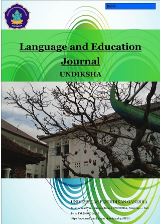THE EFFECT OF QUIZIZZ ON ENGLISH ACHIEVEMENT OF TENTH GRADE EFL STUDENTS
Keywords:
Quizizz, Gamification, EFLAbstract
This study aimed to investigate the effect of Quizizz application on SMA Negeri 1 Singaraja's tenth-grade students' English achievement. This study was a quasi-experimental study utilizing a post-test-only control group design. This study’s population was all tenth-grade students of SMA Negeri 1 Singaraja in the academic year 2020/2021, which consisted of 366 students. Cluster random sampling was used as a sampling technique for this study. There were two classes used as the sample of this study, namely X MIPA 4 and X MIPA 6. The two classes used as a sample consisted of 34 students, respectively. Class X MIPA 4 was used as an experimental group taught using Quizizz. In contrast, X MIPA 6 was used as a control group taught without Quizizz. The data collection method in this study used a multiple-choice test which consisted of 19 questions. The English test covered three topics: simple past and present perfect tense, recount text, and narrative text. The data obtained showed the value of the experimental group (M = 84.51, p-value = 0.012) and the control group (M = 78.16, p-value = 0.012). Based on the data obtained, it was known that the average value of the experimental group was greater than the control group. Furthermore, it was also known that the significance value obtained 0.012, which was less than 0.05. Comparing the mean value of the control and experimental groups, which is supported by the significance value, proves that Quizizz affects students’ English achievement.References
Abdullah, Y. L. P. K., Abdullah, A. N., Govindasamy, P., & Yunus, M. M. (2019). Learn idioms the fun and mobile way with quizizz. International Journal of Scientific and Technology Research, 8(12), 1749–1752.
Ary, D., Jacobs, L., & Sorensen, C. (2010). Introduction to Research in Education (8th ed.). Wadsworth: Cengage Learning
Barata, G., Gama, S., Jorge, J., & Goncalves, D. (2013). Engaging engineering students with Gamification. 2013 5th International Conference on Games and Virtual Worlds for Serious Applications, VS-GAMES 2013, September. https://doi.org/10.1109/VS-GAMES.2013.6624228
Chaiyo, Y., & Nokham, R. (2017). The effect of Kahoot, Quizizz and Google Forms on the student's perception in the classroom response system. 2nd Joint International Conference on Digital Arts, Media and Technology 2017: Digital Economy for Sustainable Growth, ICDAMT 2017. https://doi.org/10.1109/ICDAMT.2017.7904957
Darmawan, M. S., Daeni, F., & Listiaji, P. (2020). The Use of Quizizz As an Online Assessment Application for Science Learning in the Pandemic Era. Unnes Science Educational Journal (USEJ), 9(3), 144–150. http://journal.unnes.ac.id/sju/index.php/usej
Dewi, K. S., Myartawan, I. P. N. W., Swari, N. K. T. A., & Sugihartini, N. (2020). Quizizz Effect on Students' Grammar Mastery in Higher Efl Classroom-Based Mobile Assisted Language Learning (Mall). 3(1), 15–24.
Gay, L. R., Mills, G. E., Airasian, P. (2012). Educational Research: Competencies for Analysis and Application. United States of America: Pearson Education, Inc.
Juniarta, P. A. K., Dewi, K. S., Mahendrayana, G., & Swandana, I. W. (2020). The Analysis on the Implementation of Mobile-Assisted Language Learning Strategy Through Quizizz Application to Improve Student’s Reading Comprehension at Undiksha Singaraja. Advances in Social Science, Education and Humanities Research, 394(Icirad 2019), 323–327. https://doi.org/10.2991/assehr.k.200115.053
Lamrani, R., & Abdelwahed, E. H. (2020). Game-based learning and Gamification to improve skills in early years education. Computer Science and Information Systems, 17(1), 339–356. https://doi.org/https://doi.org/10.2298/CSIS190511043L
Nanda, S. R., Abdul, N. B., & Daddi, H. (2018). The Use of Quizizz Application in Improving Students’ Reading Comprehension Skill at SMKN 3 Takalar : An Experimental Research. Journal of Computer Interaction in Education, 1(2), 173–182.
Pitoyo, M. D., Sumardi, & Asib, A. (2020). Gamification-Based Assessment: The Washback Effect of Quizizz on Students’ Learning in Higher Education. International Journal of Language Education, 4(1), 1–10. https://doi.org/10.26858/ijole.v4i2.8188
Priyanti, N. W. I., Santosa, M. H., & Dewi, K. S. (2019). Effect of Quizizz Towards the Eleventh-Grade English Students’ Reading Comprehension in Mobile Learning Context. Language and Education Journal Undiksha, 2(2), 71–80. https://doi.org/10.23887/leju.v2i2.20323
Rahayu, I. S. D., & Purnawarman, P. (2019). The Use of Quizizz in Improving Students’ Grammar Understanding through Self-Assessment. 254(Conaplin 2018), 102–106. https://doi.org/10.2991/conaplin-18.2019.235
Santosa, M. H. (2017). Learning approaches of Indonesian EFL Gen Z students in a Flipped Learning context. Journal on English as a Foreign Language. https://doi.org/10.23971/jefl.v7i2.689
Wibisono, D. (2012). The Effect of Kahoot! in Teaching Reading to Tenth Grade Students. Magister Scientiae.
Yudiastini Astuti, N. W. (2018). Assessing students’ belief of learning English as a foreign language through metaphor analysis in senior high school level. Asian EFL Journal.
Yulia, H. (2020). Online Learning to Prevent the Spread of Pandemic Corona Virus in Indonesia. ETERNAL (English Teaching Journal), 11(1), 48–56. https://doi.org/10.26877/eternal.v11i1.6068
Downloads
Published
How to Cite
Issue
Section
License
Copyright (c) 2022 Language and Education Journal Undiksha

This work is licensed under a Creative Commons Attribution-ShareAlike 4.0 International License.










